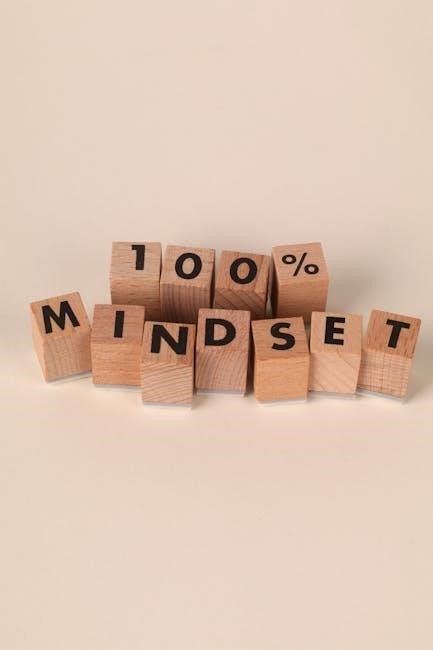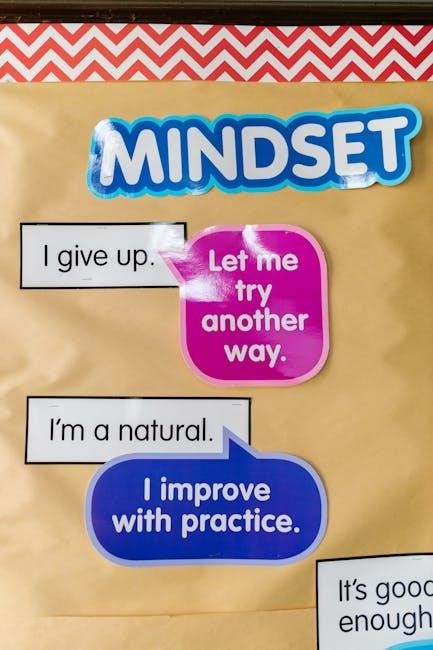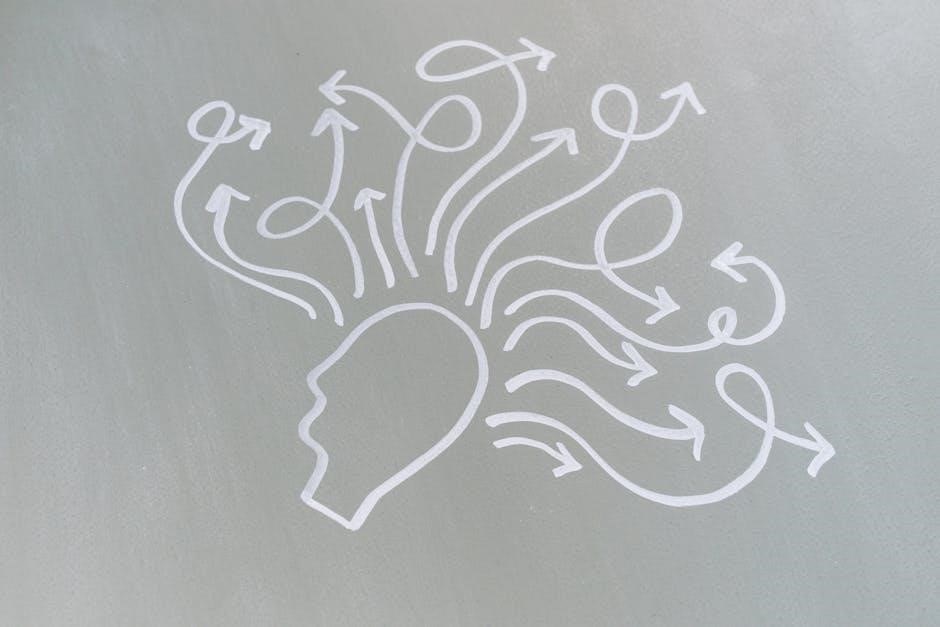Dr. Carol S. Dweck’s groundbreaking book introduces the concept of fixed and growth mindsets, revealing how beliefs shape behavior, achievement, and success. This transformative work challenges traditional views on talent and ability, emphasizing the power of mindset in personal and professional growth. Through decades of research, Dweck provides insights into fostering resilience, overcoming obstacles, and embracing lifelong learning. The updated edition offers new strategies and real-world applications, making it a must-read for anyone seeking to unlock their full potential.
1.1 Overview of the Book
Mindset: The New Psychology of Success by Carol S. Dweck is a seminal work that redefines success beyond talent and ability. It introduces the concepts of fixed and growth mindsets, supported by decades of research. The book explores how these mindsets influence behavior, achievement, and resilience. With engaging examples and updated insights, it offers practical strategies for personal and professional growth, making it a transformative read for all.
1.2 Author Carol S. Dweck and Her Contributions to Psychology
Dr. Carol S. Dweck is a world-renowned psychologist celebrated for her pioneering research on fixed and growth mindsets. Her work has profoundly shaped understanding of human potential, influencing education, sports, and business. As the Lewis and Virginia Eaton Professor of Psychology at Stanford University, Dweck’s insights have redefined success, emphasizing mindset over talent, and inspired resilience and lifelong learning across diverse fields.
1.3 The Main Thesis of the Book
Carol S. Dweck’s central argument is that success is deeply influenced by one’s mindset. She introduces two core concepts: the fixed mindset, which believes abilities are innate, and the growth mindset, which sees potential for development through effort; The book contends that embracing a growth mindset fosters resilience, learning, and achievement, challenging the notion that talent alone determines success. This idea has revolutionized understanding of human potential.
The Concept of Fixed and Growth Mindsets
Fixed mindset believes abilities are innate, while growth mindset sees potential for development through effort. These beliefs profoundly influence behavior, resilience, and success in various domains.
2.1 Definition of Fixed Mindset
A fixed mindset is the belief that abilities, intelligence, and talents are innate and unchangeable. People with this mindset avoid challenges to prevent failure, equating success with validation of their innate abilities. They often feel threatened by others’ achievements and struggle with setbacks, as they view effort as a sign of inadequacy rather than a path to growth.
2.2 Definition of Growth Mindset
A growth mindset is the belief that abilities and intelligence can be developed through effort, learning, and persistence. People with this mindset view challenges as opportunities for growth and embrace failures as stepping stones to improvement. They focus on progress rather than perfection, understanding that success comes from dedication and resilience, not just innate talent or ability.
2.3 Key Differences Between the Two Mindsets
The fixed mindset believes abilities are innate and unchangeable, while the growth mindset sees potential for development through effort and learning. Fixed mindsets fear failure, avoiding challenges to protect ego, whereas growth mindsets embrace obstacles as opportunities to grow. Fixed mindsets focus on proving ability, while growth mindsets prioritize improving and learning, leading to greater resilience and long-term success in various domains.

The Role of Beliefs in Shaping Success
Beliefs about abilities profoundly influence behavior and achievement, with fixed mindsets limiting potential and growth mindsets fostering resilience and lifelong learning, as Dweck’s research reveals.
3.1 How Beliefs Influence Behavior and Achievement
Beliefs about abilities significantly shape behavior and achievement. A fixed mindset leads individuals to avoid challenges, fearing failure may expose inadequacies, while a growth mindset encourages embracing challenges as opportunities to learn and improve. These beliefs influence effort, persistence, and resilience, with growth-oriented individuals more likely to persevere through obstacles, ultimately achieving greater success and personal growth.
3.2 The Impact of Mindset on Perceptions of Obstacles and Failures
Individuals with a fixed mindset often view obstacles and failures as insurmountable, believing they reveal inherent limitations. In contrast, those with a growth mindset see challenges and setbacks as opportunities for learning and improvement. This difference in perception profoundly influences resilience, adaptability, and the willingness to persist in the face of adversity, ultimately shaping long-term success and personal development.

Applications of Mindset in Various Domains
Mindset principles are applied across education, sports, business, and parenting, fostering success by encouraging growth, resilience, and adaptability in diverse contexts, as highlighted in Dweck’s research.
4.1 Mindset in Education and Learning
Educators play a crucial role in fostering a growth mindset among students, enhancing motivation and achievement. By emphasizing effort and progress, teachers help students view challenges as opportunities for growth rather than obstacles. Dweck’s research highlights how this approach cultivates resilience and a love for learning, leading to greater academic success and personal development in educational settings.
4.2 Mindset in Sports and Athletics
Athletes and coaches can benefit greatly from adopting a growth mindset, which emphasizes effort, persistence, and learning from setbacks. This approach helps athletes overcome challenges, build resilience, and achieve higher levels of performance. A fixed mindset, on the other hand, can limit potential by focusing on innate talent rather than improvement. Dweck’s insights empower athletes to embrace continuous growth and excel in their sports careers.
4.3 Mindset in Business and Leadership
In business, a growth mindset fosters innovation, resilience, and collaboration, enabling leaders to adapt to challenges and drive growth. It encourages embracing failures as learning opportunities and prioritizing effort over talent. A fixed mindset, however, can stifle progress by focusing on maintaining status quo; Dweck’s insights help leaders cultivate a culture of continuous improvement, empowering teams to thrive in dynamic environments and achieve sustainable success.
4.4 Mindset in Parenting and Personal Relationships
A growth mindset in parenting fosters resilience and confidence in children by emphasizing effort and learning from setbacks. It encourages open communication and mutual growth in personal relationships. Conversely, a fixed mindset may limit a child’s potential by focusing on innate abilities rather than development. Dweck’s principles help parents and partners create supportive environments, nurturing emotional intelligence and stronger, more adaptable relationships.
The Psychology of Success
Success is redefined by mindset, emphasizing resilience and lifelong learning over innate talent. Dweck’s research shows how beliefs about abilities shape achievement, fostering personal and professional growth.
5.1 Redefining Success Beyond Talent and Ability
Carol Dweck’s work challenges the notion that success is solely determined by innate talent or ability. Instead, she emphasizes the role of mindset, effort, and persistence in achieving success. By shifting focus from fixed traits to growth-oriented behaviors, individuals can unlock their potential and redefine success as a journey of continuous improvement and resilience.
This perspective fosters a culture where challenges are viewed as opportunities for growth, and failure is seen as a stepping stone to success. Dweck’s insights empower individuals to embrace lifelong learning and self-improvement, ultimately redefining success as a dynamic and achievable process for all.
5.2 The Role of Resilience in Achieving Success
Resilience plays a crucial role in achieving success by enabling individuals to bounce back from setbacks and view failures as opportunities for growth. A growth mindset fosters resilience, allowing people to persist through challenges and adapt to changing circumstances. This capacity to recover and learn from adversity is essential for long-term success and personal development, as highlighted in Dweck’s research.
5.3 The Importance of Self-Improvement and Lifelong Learning
Self-improvement and lifelong learning are essential for personal and professional growth. A growth mindset encourages embracing challenges and viewing failures as opportunities to learn. By prioritizing continuous development, individuals can enhance their abilities and adapt to evolving demands. Dweck’s updated edition emphasizes the significance of ongoing effort and learning in achieving lasting success and fulfillment.

Practical Strategies for Developing a Growth Mindset
Practical strategies for cultivating a growth mindset include embracing challenges, persisting through obstacles, and learning from feedback. These approaches foster resilience and continuous improvement.
6.1 Embracing Challenges as Opportunities for Growth
Embracing challenges as opportunities for growth is central to a growth mindset. Viewing obstacles as chances to learn and improve fosters resilience and a positive outlook. By actively seeking challenges, individuals can develop new skills and build confidence. This approach encourages effort, persistence, and learning from setbacks, ultimately leading to personal and professional development.
6.2 The Power of Effort and Persistence
The power of effort and persistence lies at the heart of a growth mindset. Emphasizing hard work over innate talent, Dweck shows how consistent effort leads to significant progress. Persistence in the face of obstacles fosters resilience and mastery. By valuing effort, individuals cultivate a deeper understanding of their capabilities, ultimately achieving greater success and personal growth through dedication and perseverance.
6.3 Learning from Feedback and Criticism
Embracing feedback and criticism is a cornerstone of a growth mindset. Dweck explains that individuals with this mindset view criticism as a valuable tool for improvement rather than a personal attack. By actively seeking, interpreting, and acting on feedback, people can identify areas for growth and refine their skills. This approach fosters resilience and accelerates personal and professional development, helping individuals overcome limitations and achieve their full potential.

The Impact of Mindset on Personal Growth
A growth mindset fosters confidence by encouraging individuals to believe in their ability to improve through effort and learning. This belief enhances self-esteem and resilience, leading to greater personal fulfillment and achievement over time.
7.1 Building Confidence and Self-Esteem
A growth mindset empowers individuals to view challenges as opportunities for growth, fostering confidence and self-esteem. By believing in their ability to improve through effort and learning, people embrace obstacles as stepping stones rather than barriers. This shift in perception encourages resilience, helping individuals develop a stronger sense of self-worth and confidence in their abilities, leading to greater personal and professional growth over time.
7.2 Overcoming Fear of Failure
A growth mindset helps individuals reframe failure as a stepping stone for growth rather than a defining setback. By viewing challenges as opportunities to learn, people reduce their fear of failure and develop resilience. This shift in perspective allows them to embrace effort and persistence, fostering progress and confidence. Overcoming fear of failure becomes possible when success is tied to learning, not perfection.
7.3 Cultivating a Positive Outlook on Life
A growth mindset fosters a positive outlook by reframing challenges as opportunities for growth. By embracing effort and persistence, individuals develop resilience, viewing setbacks as temporary and survivable. This perspective shifts focus from perfection to progress, allowing people to maintain optimism and confidence. A positive outlook, rooted in a growth mindset, enhances overall well-being and leads to a more fulfilling life.

The Role of Mindset in Achieving Resilience
A growth mindset enables individuals to view challenges as opportunities for growth, fostering resilience. It contrasts with a fixed mindset, which often hinders adaptability and recovery from setbacks.
8.1 Bouncing Back from Adversity
A growth mindset empowers individuals to bounce back from adversity by viewing challenges as opportunities for growth. This contrasts with a fixed mindset, which often leads to avoidance and discouragement. Dweck’s research highlights how beliefs about ability and effort significantly influence resilience. By embracing challenges and persisting through obstacles, individuals with a growth mindset demonstrate greater adaptability and recovery, ultimately achieving long-term success and personal development.
8.2 Developing Coping Strategies for Stress and Setbacks
A growth mindset fosters resilience by enabling individuals to develop effective coping strategies for stress and setbacks. Dweck’s research shows that viewing challenges as opportunities for growth, rather than threats, enhances problem-solving skills and emotional regulation. By reframing obstacles, seeking feedback, and practicing self-compassion, individuals can transform setbacks into stepping stones for personal and professional development, ultimately building mental and emotional resilience.

The Book’s Reception and Reviews
Mindset: The New Psychology of Success has received widespread critical acclaim for its transformative insights. It is a million-copy bestseller, praised for its practical applications and profound impact on personal and professional growth. Readers and experts alike celebrate its ability to redefine success and resilience, making it a cornerstone of modern psychological thought.
9.1 Critical Acclaim and Popularity of the Book
Mindset: The New Psychology of Success has garnered widespread critical acclaim and popularity. As a million-copy bestseller, it has been praised by experts and readers alike for its transformative insights. The book’s practical applications and profound impact on personal and professional growth have made it a cornerstone of modern psychological thought, influencing fields such as education, business, and sports. Its enduring popularity underscores its relevance in fostering resilience and redefining success.
9.2 Real-World Applications of the Mindset Concept
The mindset concept has been widely applied across various domains. In education, it has transformed teaching methods, encouraging a focus on effort and growth. In sports, athletes use it to enhance performance and resilience; Businesses adopt it to foster innovation and leadership, while parents employ it to nurture children’s confidence. These real-world applications demonstrate the concept’s versatility and effectiveness in driving success and personal development across diverse contexts and industries.

The Updated Edition of “Mindset”
The updated edition of Mindset: The New Psychology of Success offers fresh insights, expanded research, and practical strategies for cultivating a growth mindset. Dr. Carol S. Dweck provides new perspectives on resilience, self-improvement, and overcoming challenges, making this edition a valuable resource for personal and professional development.
10.1 New Insights and Updates in the Latest Edition
The updated edition of Mindset: The New Psychology of Success includes fresh research findings, enhanced strategies for personal and professional growth, and real-world applications of the mindset concept. Dr. Carol S. Dweck expands on her groundbreaking theory, offering new perspectives on resilience, overcoming challenges, and fostering a growth mindset in various domains. This edition provides readers with practical tools to apply mindset principles effectively in their lives.
10.2 Expanded Research and Case Studies
The latest edition of Mindset: The New Psychology of Success features expanded research and case studies, providing deeper insights into how mindsets influence behavior and achievement. Dr. Carol S. Dweck includes real-world examples from education, sports, and business, demonstrating the practical application of mindset principles. These additions enrich the reader’s understanding of how mindset shapes success and resilience in diverse contexts.

The Significance of the Book in Modern Psychology
Mindset: The New Psychology of Success is a seminal work in modern psychology, redefining success beyond talent and ability. Its insights into fixed and growth mindsets have profoundly influenced educational, organizational, and developmental practices, offering practical strategies for fostering resilience and achievement across various domains.
11.1 Contribution to the Field of Developmental Psychology
Carol S. Dweck’s work has revolutionized developmental psychology by introducing the concept of fixed and growth mindsets. Her research demonstrates how beliefs about ability influence behavior, achievement, and resilience. This theory has reshaped understanding of human development, emphasizing the role of mindset in shaping outcomes across lifespan. Dweck’s insights have transformed educational practices, parenting strategies, and organizational development, fostering a culture of growth and lifelong learning.
11.2 Influence on Educational and Organizational Practices
Dweck’s mindset theory has profoundly impacted education and organizations by promoting growth-oriented environments. Schools worldwide now adopt practices encouraging effort and persistence, while businesses foster innovation and resilience. Leaders and educators use mindset principles to enhance performance, collaboration, and adaptability, creating cultures where challenges are seen as growth opportunities, leading to sustained success and development across all levels of organizations and educational systems.

How to Apply Mindset Principles in Daily Life
Embrace challenges, persist through obstacles, and learn from feedback to cultivate a growth mindset, fostering personal and professional growth in daily life.
12.1 Mindset Practices for Personal and Professional Growth
Adopting a growth mindset involves embracing challenges, persisting through obstacles, and viewing feedback as a tool for improvement. Practice self-reflection to identify fixed mindset triggers and replace them with growth-oriented thoughts. Cultivate resilience by framing failures as learning opportunities. Encourage open communication and collaboration in teams to foster collective growth. These practices empower individuals to thrive personally and professionally, unlocking their full potential.
12.2 Integrating Mindset into Workplace Culture
Leaders can foster a growth mindset by modeling openness to learning and embracing challenges. Encourage teams to view failures as opportunities for growth and innovation. Provide constructive feedback that focuses on effort and improvement rather than results. Promote collaboration and psychological safety, allowing employees to take risks without fear of judgment. This culture shift can drive creativity, resilience, and sustained success across the organization.
The Future of Mindset Research
Future research will explore new applications of mindset theory across diverse fields, focusing on interdisciplinary studies and innovative strategies to enhance personal and professional development globally.
13.1 Emerging Trends in Mindset Studies
Emerging trends in mindset studies focus on expanding the concept into new domains, such as AI, neuroscience, and cultural psychology. Researchers are exploring how growth and fixed mindsets interact with technology and diverse societal norms. Additionally, there is a growing emphasis on applying mindset principles to address global challenges, fostering resilience, and promoting equity in education and workplace settings. These advancements aim to deepen understanding and broaden the practical applications of mindset theory.
13.2 Potential Applications in Future Research
Future research on mindset could explore its integration with AI and neuroscience to deepen understanding of cognitive processes. Cultural psychology studies may reveal how mindset varies across societies, while educational research could develop new interventions. Additionally, investigating mindset in leadership and technology fields may uncover innovative applications, ultimately aiming to create more equitable and resilient societies by fostering growth mindsets at scale.
Mindset: The New Psychology of Success redefines achievement, emphasizing growth over talent. Its insights empower readers to embrace challenges, fostering resilience and lifelong learning, leaving a lasting impact on personal and professional growth.
14.1 Summary of Key Takeaways
Mindset: The New Psychology of Success highlights how fixed and growth mindsets shape behavior and achievement. It emphasizes that success stems from resilience, effort, and embracing challenges, not just talent. By fostering a growth mindset, individuals can overcome obstacles, learn from failures, and achieve personal and professional growth. The book offers practical strategies for cultivating this mindset, ultimately leading to a more fulfilling and successful life.
14.2 The Lasting Impact of “Mindset” on Readers
Mindset: The New Psychology of Success has profoundly influenced readers by reshaping their beliefs about ability and achievement. It empowers individuals to embrace challenges, persist through setbacks, and view failure as a growth opportunity. The book’s insights have inspired personal and professional transformations, fostering resilience and a lifelong commitment to learning. Its impact extends beyond individual readers, influencing education, leadership, and parenting, leaving a lasting legacy in modern psychology.

